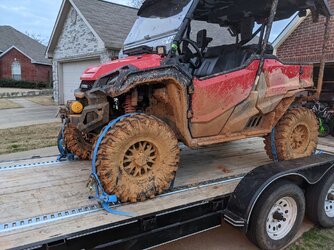New to the forum and have asked a few questions before.and now i would like opinions regarding the right size trailer to tow my ride. Looking at both single and tandem axle trailer at the moment. Would also like thoughts regarding how to secure the ride on the trailer, ie e-tracks, Erickson mounts, etc. Thanks in advance.
You are using an out of date browser. It may not display this or other websites correctly.
You should upgrade or use an alternative browser.
You should upgrade or use an alternative browser.
Buggyman
Well-Known Member
Lifetime Member
Supporting Member
imho that size would depend on what you plan on hauling. if you just plan on towing your ride there is probably no reason to pay the extra money for a tandem axel trailer, plus plates ,tires. I don't know the length of your ride but something like a 6 x12 should work. I tie down with 4 ratchet straps but also I don't haul mine all that often. it seems a lot of guys like the track system with over the wheel straps. I guess it comes down to intended use and personal preference.

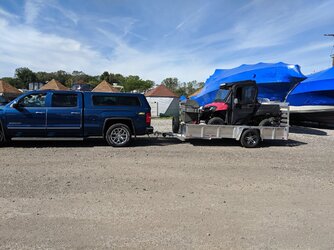

Pilotadam
Well-Known Member
Lifetime Member
As mentioned it depends on what all your going to haul. I use a single axel 7x 14. It gives me extra room for coolers and gas cans. As a side note I did add brakes to mine to help braking when I tow with my wife's Pilot.
To die it down I use wheel nets from Mac"s tie down. I just mounted tie down point to the deck to connect the die down nets. I love this system. Not cheap but what I am securing isn't cheap. I have towed mine or 5000miles with no problems.
Sent from my SM-G781V using Tapatalk
To die it down I use wheel nets from Mac"s tie down. I just mounted tie down point to the deck to connect the die down nets. I love this system. Not cheap but what I am securing isn't cheap. I have towed mine or 5000miles with no problems.
Sent from my SM-G781V using Tapatalk
Hondoman
Fundamentals are the crutch for the talentless.
Lifetime Member
C
I found a used 12’ single axle that I am using. This trailer is rated for about 2000 lbs load. I believe this is about the smallest trailer you can use for the 1000-5.
I also use 4 straps to tie down. The manual shows tie down spots - which are for the rear use the rear roll bar and for the front use the front bumper.
If planning on trailering long distances it may be good to have dual axle and longer trailer. Extra gear, weight and if you have a flat you can keep on rolling to a safe place to change tire.
Rock on
Tom
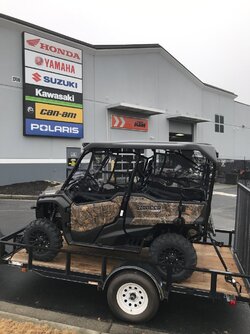
I also use 4 straps to tie down. The manual shows tie down spots - which are for the rear use the rear roll bar and for the front use the front bumper.
If planning on trailering long distances it may be good to have dual axle and longer trailer. Extra gear, weight and if you have a flat you can keep on rolling to a safe place to change tire.
Rock on
Tom

I have a 6x12 utility trailer, the smallest you could go is a 6x10. I use the over the wheel etrack system from Erickson, i do all 4 wheels as when I only did the fronts i had issues with them coming off.
I’ve put over 6k mi on my 6x12 this year and it’s done great. I don’t worry as much about blow outs with this light of a setup, if the total load, including trailer weight, was over 4k I’d want a tandem axle. I may also add tire sensors to monitor pressure and temp to it when i change out the tires.
I do like the extra protection of the side rails and rear gate the utility trailer provides as a secondary safety if the straps fail especially on bouncier roads like washboard gravel.
I’ve put over 6k mi on my 6x12 this year and it’s done great. I don’t worry as much about blow outs with this light of a setup, if the total load, including trailer weight, was over 4k I’d want a tandem axle. I may also add tire sensors to monitor pressure and temp to it when i change out the tires.
I do like the extra protection of the side rails and rear gate the utility trailer provides as a secondary safety if the straps fail especially on bouncier roads like washboard gravel.
Last edited:
CID
Well-Known Member
Lifetime Member
Supporting Member
Here are a couple of good threads with lots of ideas. Be sure to watch the two Shock Therapy videos there.
 hondasxs.com
hondasxs.com

 hondasxs.com
hondasxs.com
P1000 - Trailer tie down
What is the best way to tie down my 1000-5 on the trailer. Also have a concern, should the SXS be in Park when tied down.?? Thinking about a shock load on Parking mechanism in trans. Almost wish there was an emergency brake lever ...Yes, I know there are those who will forget the brake is...
Trailers, Straps and Avoiding Mishaps...
So Being new to the SXS world I thought I would start a conversation about towing, strapping and traveling with your machine in general. We are about to drive four hours tomorrow to pick up my Son, his wife and their Talon then we will be heading another two hours up into the Big Horns. (I...
Last edited:
C
You have some heavy duty trailers. I have not seen a single axle payload that can hold two tons.I have a 6x12 utility trailer, the smallest you could go is a 6x10. I use the over the wheel etrack system from Erickson, i do all 4 wheels as when I only did the fronts i had issues with them coming off.
I’ve put over 6k mi on my 6x12 this year and it’s done great. I don’t worry as much about blow outs with this light of a setup, if the total load was over 4k I’d want a tandem axle. I may also add tire sensors to monitor pressure and temp to it when i change out the tires.
I do like the extra protection of the side rails and rear gate the utility trailer provides as a secondary safety if the straps fail especially on bouncier roads like washboard gravel.
Here are the specs from common trailers in my area.
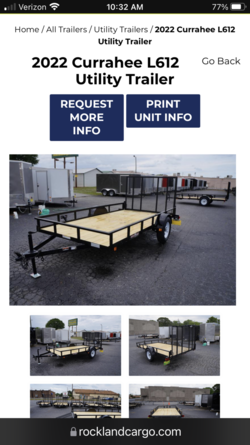
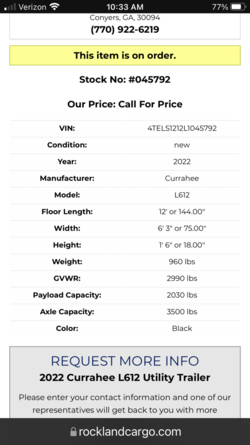
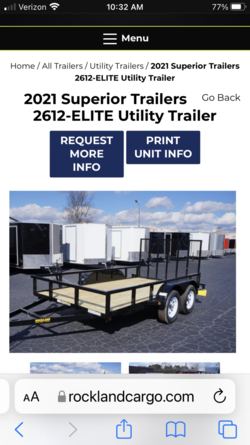
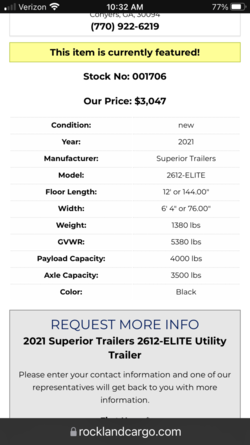
Dirtstiffs-1000
Well-Known Member
Lifetime Member
Supporting Member
- Nov 3, 2018
- 1,657
- 6,034
- 113
- Ownership
-
1000-5
I have a 7 x14 Eagle Iron single axle.
I added heavy duty 15" rims, heavier load rated - radial trailer tires, Timken bearings and seals, along with self adjusting Dexter electric breaks.
It pulls and breaks great but would be better in a tandem axle.
It's on the edge of the GVWR.
Get a tandem with dual axle brakes, if you can swing it.
I hope to add a covered tandem this summer.

I added heavy duty 15" rims, heavier load rated - radial trailer tires, Timken bearings and seals, along with self adjusting Dexter electric breaks.
It pulls and breaks great but would be better in a tandem axle.
It's on the edge of the GVWR.
Get a tandem with dual axle brakes, if you can swing it.
I hope to add a covered tandem this summer.
Last edited:
That was a general guideline I’d use as you can get a single axle trailer with a 5k axle on it, not as common as the 3k but the weight’s i listed were based on gvwr for my consideration of tandem vs single, not load.You have some heavy duty trailers. I have not seen a single axle payload that can hold two tons.
Here are the specs from common trailers in my area.
View attachment 312628 View attachment 312629 View attachment 312630 View attachment 312631
What I was saying is I’m not as concerned with a blow out on a single axle trailer with the light loads being carried, our pioneers aren’t heavy. I also have a 6x14 tandem that has a 10k gvwr as it has two 5k axles.
Last edited:
advertisement
Ridinfool
NTC’ s special Ed student of the year
Lifetime Member
Supporting Member
My 2cents… get the biggest trailer you are comfortable pulling and can store when not in use.
a tandem axel will pull better with a load plus if you have a blowout at highway speed it is a little easier to control.
Why the biggest trailer you ask?
When you load your buggy up to go to your riding location are you bringing a cooler? Extra gas cans? Tents? Spare parts for your buggy? All can be loaded on the trailer and save room for other things in the tow rig.
Also, if you have a trailer sitting at your house and need to move something, your gonna use your trailer. In my world a trailer is a great tool to have around, and the more things I can use it for, the easier it is to justify the cost, especially in Biden’s America… LETS GO BRANDON!!!
Good luck
a tandem axel will pull better with a load plus if you have a blowout at highway speed it is a little easier to control.
Why the biggest trailer you ask?
When you load your buggy up to go to your riding location are you bringing a cooler? Extra gas cans? Tents? Spare parts for your buggy? All can be loaded on the trailer and save room for other things in the tow rig.
Also, if you have a trailer sitting at your house and need to move something, your gonna use your trailer. In my world a trailer is a great tool to have around, and the more things I can use it for, the easier it is to justify the cost, especially in Biden’s America… LETS GO BRANDON!!!
Good luck
E
elkguide
Well-Known Member
Lifetime Member
Supporting Member
Old school here and probably because I always end up carrying more than I should but I currently have 4 trailers and a dump trailer and they are all double axle. The last time I used a single axle trailer and had a blow out was my last!!!!! I like my stuff.
My trailers are 6 or 7 feet wide and 16 to 18 feet long.
My trailers are 6 or 7 feet wide and 16 to 18 feet long.
The first rule of buying a trailer is whatever you buy will eventually be too small...
If you're only going to tow the Pioneer, most any light duty trailer will work. The problem is that once you have a trailer, you find all kinds of things you need to haul. You didn't say what you're going to tow with, but that really sets the bar as to what trailer to consider.
As others have said, one advantage to a tandem is you can have a flat and it probably isn't going to be catastrophic. A problem on a single axle tire at highway speeds with a 1 ton+ load could be exciting.
We've got four trailers:
I use Vulcan tire straps to hold the Pioneer down. They lock onto the D Rings on the floor of the 20' enclosed and the dump trailers. Once you figure them out, they go on quick and hold tight. https://amazon.com/gp/product/B0714FZ7VN/?tag=sxsweb24-20
The first three trailers were used to move our FL homestead to our WV farm over a total of 9 trips, 1900 miles roundtrip. (Technically we have a fifth trailer, a 48' dry van with a 4400# liftgate, that was used in the move. I paid a trucker from FL to bring it up and then paid a local trucker to bring it the mile down our narrow, winding road.)
The most limiting factor when buying a trailer is the tow vehicle. Our Toyota Tundra has the factory tow package, a quality brake controller, and air bags. It weighs around 6400# and it's max tow capacity is spec'd around 10,500#- about the max GVWR of the 20' enclosed trailer.
While 10,500# sounds like a lot of capacity, you lose about 4000# due to the trailer's weight. If you're moving heavy stuff, it's very easy to exceed 6500# in 20'.
The 18' enclosed trailer only made one trip, containing stuff we wouldn't need for a while, as it's cargo capacity is only around 4600#. We bought the 20' trailer to use as the primary move trailer since it had 5200# axles.
Even with the added weight capacity, the 20' trailer was probably well over 10,500# on a couple trips. I bent axles on two trips where it was loaded heavy and I hit potholes I couldn't avoid on the Interstate in SC. (SC has the absolute WORST highways of FL, GA, NC, VA, and even WV.)
On a side note, it's actually pretty easy to straighten a trailer axle with a logging chain and a hydraulic ram... (Plenty of YouTube videos, including one from a truck shop in Central FL that uses lasers and a computer to do it for RVs and trailers.)
I put new tires on the 18' enclosed and the 18' flatbed before bringing them up. It was cheap insurance to minimize the chance of a blowout.
All of the trailers have electric brakes. When putting the new tires on the flatbed, I discovered it only had brakes on the front axle and the rear axle couldn't have them added easily. It turns out this is VERY common on tandem flatbeds with 3500# axles. It's not a huge problem unless you're hauling a lot of weight. Especially when the towed weight exceeds the towing vehicle weight, brakes are important to keep the trailer from shoving the tow vehicle during slowing or stopping. Learning how to set the brake controller for a given trailer, given cargo, and road conditions is a critical skill. Even more important is learning how to load a trailer for proper tongue weight.
If you're only going to tow the Pioneer, most any light duty trailer will work. The problem is that once you have a trailer, you find all kinds of things you need to haul. You didn't say what you're going to tow with, but that really sets the bar as to what trailer to consider.
As others have said, one advantage to a tandem is you can have a flat and it probably isn't going to be catastrophic. A problem on a single axle tire at highway speeds with a 1 ton+ load could be exciting.
We've got four trailers:
- 18' Dovetail Flatbed w/ Tandem 3500# Axles
- 18' Enclosed w/ Tandem 3500# Axles
- 20' Enclosed w/ Tandem 5200# Axles
- 14' Dump Trailer w/ Tandem 7000# Axels
I use Vulcan tire straps to hold the Pioneer down. They lock onto the D Rings on the floor of the 20' enclosed and the dump trailers. Once you figure them out, they go on quick and hold tight. https://amazon.com/gp/product/B0714FZ7VN/?tag=sxsweb24-20
The first three trailers were used to move our FL homestead to our WV farm over a total of 9 trips, 1900 miles roundtrip. (Technically we have a fifth trailer, a 48' dry van with a 4400# liftgate, that was used in the move. I paid a trucker from FL to bring it up and then paid a local trucker to bring it the mile down our narrow, winding road.)
The most limiting factor when buying a trailer is the tow vehicle. Our Toyota Tundra has the factory tow package, a quality brake controller, and air bags. It weighs around 6400# and it's max tow capacity is spec'd around 10,500#- about the max GVWR of the 20' enclosed trailer.
While 10,500# sounds like a lot of capacity, you lose about 4000# due to the trailer's weight. If you're moving heavy stuff, it's very easy to exceed 6500# in 20'.
The 18' enclosed trailer only made one trip, containing stuff we wouldn't need for a while, as it's cargo capacity is only around 4600#. We bought the 20' trailer to use as the primary move trailer since it had 5200# axles.
Even with the added weight capacity, the 20' trailer was probably well over 10,500# on a couple trips. I bent axles on two trips where it was loaded heavy and I hit potholes I couldn't avoid on the Interstate in SC. (SC has the absolute WORST highways of FL, GA, NC, VA, and even WV.)
On a side note, it's actually pretty easy to straighten a trailer axle with a logging chain and a hydraulic ram... (Plenty of YouTube videos, including one from a truck shop in Central FL that uses lasers and a computer to do it for RVs and trailers.)
I put new tires on the 18' enclosed and the 18' flatbed before bringing them up. It was cheap insurance to minimize the chance of a blowout.
All of the trailers have electric brakes. When putting the new tires on the flatbed, I discovered it only had brakes on the front axle and the rear axle couldn't have them added easily. It turns out this is VERY common on tandem flatbeds with 3500# axles. It's not a huge problem unless you're hauling a lot of weight. Especially when the towed weight exceeds the towing vehicle weight, brakes are important to keep the trailer from shoving the tow vehicle during slowing or stopping. Learning how to set the brake controller for a given trailer, given cargo, and road conditions is a critical skill. Even more important is learning how to load a trailer for proper tongue weight.
I have a 7x16 steel tandem axle utility trailer with side rail ramps and a 2 foot dovetail. I wanted a 20 foot but couldnt pass up the deal on the 16 footer, but its definitely too small for what I need. Has brakes on both axles and I have 5 heavy duty D rings welded along each side for tie down points. I use 4 heavy duty 2 inch ratchet straps each rated for 3300 lbs to tie the Honda down. I'm hoping to upgrade to an aluminum frame 8.5 x 20 (at least) enclosed this summer. One tip I'll offer is figure out how big of a trailer you need, and then buy the next size bigger. Seems like as soon as you get them home and start using them they shrink....
S
I have a Aluminum16 x 7.5 enclosed trailer, split axle with electric brakes also has inlayed e-track for individual tire tie downs. the trailer is fully insulated and has emergency escape windows, so it can be used for inside shelter during bad weather, has Led lighting but wired to run on "shore power" also. The fit is tight for the Honda 1000 but it works. Tows great.
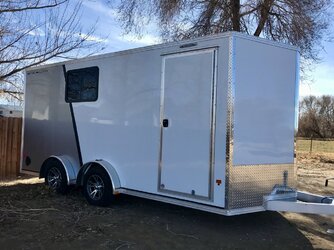
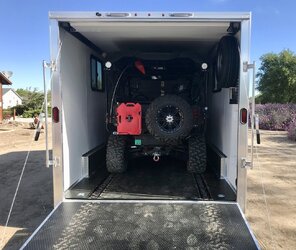
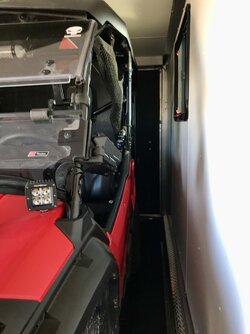



Last edited:
Thanks for all the comments. I plan on using the trailer just to haul my 1000-5 and probably my golf cart. May end up hauling up to the lake for some trail ride which is 2 hours away. Cannot really make up my mind one a single axle or a tandem or how long 12 or 14 long. I tried it on my 10’ trailer and it would not get enough weight on my trailer tongue. I will be pulling it with my Raptor so weight isn’t really an issue. I dont plan on hauling a lot of gear on the trailer when i tow it. Still undecided.
Neohio
Beast of the East
Lifetime Member
Supporting Member
Club Contributor
Did you try loading your machine backwards? Might offer more tongue weight.Thanks for all the comments. I plan on using the trailer just to haul my 1000-5 and probably my golf cart. May end up hauling up to the lake for some trail ride which is 2 hours away. Cannot really make up my mind one a single axle or a tandem or how long 12 or 14 long. I tried it on my 10’ trailer and it would not get enough weight on my trailer tongue. I will be pulling it with my Raptor so weight isn’t really an issue. I dont plan on hauling a lot of gear on the trailer when i tow it. Still undecided.
Have not tried loading it backwards but i am not a big fan of towing it on the trailer backwards.
CID
Well-Known Member
Lifetime Member
Supporting Member
My Talon is 7" longer than a Pioneer 1000 (not counting bed extender and spare) and don't have much room to spare on a 14' trailer. This position shows a 250 lb. tongue weight. The Pioneer will position similarly. I'm comfortable with a single 3500 lb. axle. If you have room to park it, longer is generally better IMO.Thanks for all the comments. I plan on using the trailer just to haul my 1000-5 and probably my golf cart. May end up hauling up to the lake for some trail ride which is 2 hours away. Cannot really make up my mind one a single axle or a tandem or how long 12 or 14 long. I tried it on my 10’ trailer and it would not get enough weight on my trailer tongue. I will be pulling it with my Raptor so weight isn’t really an issue. I dont plan on hauling a lot of gear on the trailer when i tow it. Still undecided.
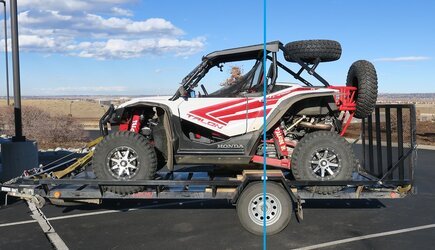
M
like alot of people said its what you need and some questions to ask yourself.
Do you have kids ?
Do you possibly have freinds or family or a significant other that may possibly be getting another utv,atv,motorcycle?
Im i going to haul other thing (firewood, construction supplies, camping supplies)and be duel purposes?
Now that i got a utv will i be going and camping for the weekends maybe i should get a larger box trailer and convert it into living quarters or buying something already set up like a toy hauler?
so you can go as small as a 10' if your only going to haul only your machine or as small as a 16' or 18' flat trailer if you maybe hauling a extra machine.
A box trailer make sure its tall enough cause most are not tall enough for the pioneer and id get at minimum 16'
Do you have kids ?
Do you possibly have freinds or family or a significant other that may possibly be getting another utv,atv,motorcycle?
Im i going to haul other thing (firewood, construction supplies, camping supplies)and be duel purposes?
Now that i got a utv will i be going and camping for the weekends maybe i should get a larger box trailer and convert it into living quarters or buying something already set up like a toy hauler?
so you can go as small as a 10' if your only going to haul only your machine or as small as a 16' or 18' flat trailer if you maybe hauling a extra machine.
A box trailer make sure its tall enough cause most are not tall enough for the pioneer and id get at minimum 16'
advertisement
Similar threads
S
- Replies
- 5
- Views
- 300


